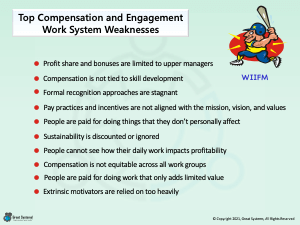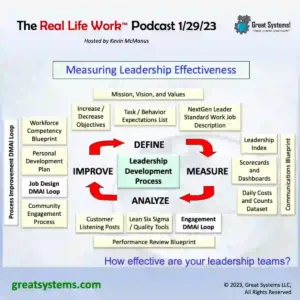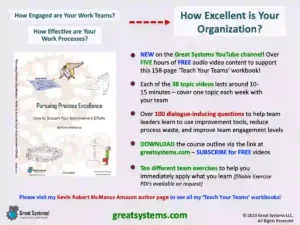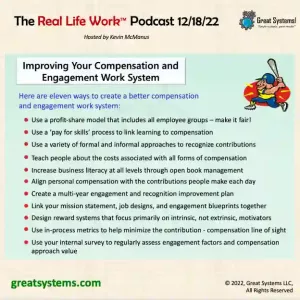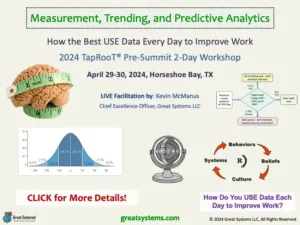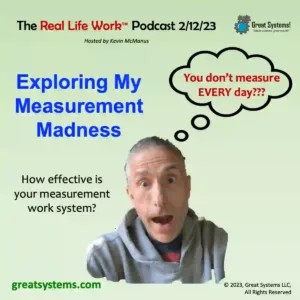Measure and improve your compensation work system to help meet organizational needs and key workforce engagement factors.
Measure and Improve Your Compensation Work System
How often do you get what you pay for? My basic definition of work is simple. Work is people spending time and money to make money.
Since you have to spend the time to earn the wages, benefits, and other forms of compensation, the equation is even more simple. People spend money each day at work to make money.
While this seems simple, many organizations fail to really make sure that the dollars paid out each day return an even higher amount of dollars back to the company. Even worse, they fail to truly engage the hearts and minds of their people.
How do you measure and improve your compensation work system?
How Fair and Value Focused is Your Compensation Work System?
I have worked in organizations where supervisors doing essentially the same type of work received drastically different levels of pay. I have seen differences as great as 50%! It is true that such discrepancies emerge over time.
It is most difficult to reduce someone’s wages once you have already set a precedent for paying them at that wage rate. You don’t have to accept this discrepancy however. You can expect greater daily contributions from those supervisors that earn more money each day.
In a similar sense, I really question at times the justification that exists for the daily wages we pay to our middle and upper managers. I struggle to see the added value that someone provides to justify the additional $25,000 a year they earn in comparison to their direct reports.
Sure, you might always have to leave the cell phone on. You might have to endure more stress, but is the difference as great as the 4 to 1, or 6 to 1, pay differentials that exist in today’s workplaces?
How Much Value Do Our Leaders Provide Daily?
This waste potential concerns me enough. Plus, we must consider the efficiency and focus factors that apply to managerial positions. We pay these people much more per hour. However, we lack the mechanisms to make sure that we receive consistent contributions from these people for each hour that they work.
For these roles, we operate largely on trust. All too often, we pay people for getting results that they really did not personally have that much to do with getting.
You don’t have to, and probably won’t, blindly accept my opinions. Some these thoughts may sound only like cynicism. I don’t expect blind acceptance. I would however ask that you watch your people work.
Look at what they truly give you each day in exchange for how you compensate them. Do you truly get what you pay for?
DISCOVER MORE: How Does Your Work Team Structure Drive Operational Excellence?
Has Your Recognition System Expired?
The number of organizations that fail to recognize employee efforts on a consistent basis continues to amaze me. Even more fail to improve their recognition processes over time.
Giveaways, such as free t-shirts, gift certificates, and coffee mugs are nice. However, they cannot represent the only forms of saying ‘thank you’ that you use over the next five to ten years.
Recognition systems have an expiration date. From a motivational theory perspective, the work of Herzberg supports this. Herzberg’s work explored the concept of satisfiers and dissatisfiers.
What works as a motivator now becomes only a dissatisfier in the future if it is taken away. In other words, over time, people begin to take for granted the things that once ‘wowed’ them. If your recognition process does not evolve over time, it will lose its effectiveness.
I have seen this happen in real life, in more than one organization. This is especially true if the organization achieves consistent performance improvement success.
For example, if your site’s cost reduction efforts regularly save a million dollars or more each year, people will begin to expect more than a meal or a $25 gift certificate when they help you to achieve this level of consistent savings. If you don’t believe me, ask and listen to your people.
Do Your People See Value in Their Work?
I’ve been both a front line manager and a corporate office person. I’ve spent hours working on the front lines as well doing the same thing minute by minute, hour by hour. Each job is hard in its own way, but there are significant differences in these types of work.
Office people can usually go to the bathroom whenever they want. They can take a break for a few minutes when things get stressful, and bask in the air conditioning when the weather gets hot. I struggle to comprehend why the people that get the most money per hour also get the best working conditions.
Are they really contributing that much more added value to their organizations?
When you do the same thing day in and day out, it becomes difficult to see the value that you give to the company each day. If you rarely see your external customers, it is even more difficult to determine if your daily efforts make a difference or not.
It has essentially become the norm. Each day, we endure work to get money so we can enjoy the things we really like to do in life. Work is a necessary evil. It’s not something we look forward to doing each day. That is a problem.
LEARN MORE: How to Measure and Improve Your Job Design Work System
Is Your Compensation Work System Designed to Recognize Excellence?
When you consider the fact that we spend the majority of our waking hours at work, this situation becomes a pretty depressing one. Not all organizations are like this however. Workplaces still exist that people enjoy coming and contributing to.
Sure, the work might be hard and stressful, but the compensation, work environment, and recognition make the work worth it. In other words, the design of the work system recognizes people for the value they provide each day. Plus, each person is consistently rewarded for helping their company sustain a balanced approach to performance improvement over time.
What makes these workplaces different than the norm? A lot of it has to do with how their compensation systems create a perception of fairness and focus. The great workplaces are also fun, or at least more fun, to be at than the average factory or office.
These organizations work hard to help people see what they earn in exchange for their daily contributions. They want their people to brag about their compensation, not complain about it.
How to Improve Your Compensation and Engagement Work System
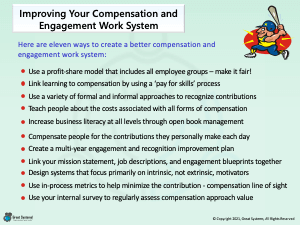
Do You Need to Measure and Improve Your Compensation Work System?
For over 40 years, I helped leaders improve their compensation work system in multiple companies and business arenas. I have discovered value added, simple ways to help pay your people for their efforts in a more effective manner. For example, you can install a profit share processes, a more robust formal recognition approach, and a pay for skills learning program.
Failing to answer the ‘what’s in it for me?” question is the primary power restrictor for this power system. When you redesign your compensation work system, you can better answer that question on a daily basis. If done properly, you will minimize the number of times people ask that question at all.
Want to increase work team engagement? If so, consider the use of my interactive and virtual compensation work system improvement workshop. Its design helps turn your employees into advocates. If you don’t want to go after the big changes, work with me to install an effective recognition process you can grow over time. It will really send a great ‘thank you’ message.
Keep improving!
Kevin McManus, Chief Excellence Officer, Great Systems
WATCH over 50 kaizen and workplace health improvement videos on my Great Systems YouTube channel.
CHECK OUT my ‘Teach Your Teams’ workbooks on Amazon.com
LIKE Great Systems on Facebook
© Copyright 2024, Great Systems LLC, All Rights Reserved
